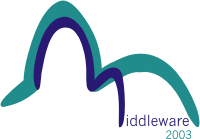 |
Middleware 2003 ACM/IFIP/USENIX International Middleware ConferenceRio Othon Palace Hotel Rio de Janeiro, Brazil 16-20 June 2003 |
|
|
Website Mirror at the University of São Paulo |
Full Paper AbstractsA Framework for Event Composition in Distributed SystemsPeter Pietzuch, Brian Shand and Jean Bacon (Cambridge U.) For large-scale distributed applications such as internet-wide or ubiquitous systems, event-based communication is an effective communication mechanism between components. In order to handle the large volume of events in such systems, composite event detection enables application components to express interest in the occurrence of complex patterns of events. However, today's middleware systems lack support for composite event detection. In this paper, we introduce a general composite event detection framework that can be added on top of existing middleware architectures --- as demonstrated in our implementation over JMS. We argue that the framework is flexible, expressive, and easy to implement. Based on finite state automata extended with a rich time model and support for parameterisation, it provides a decomposable core language for composite event specification, so that composite event detection can be distributed throughout the system. We discuss the issues associated with automatic distribution of composite event expressions and introduce the concept of higher-level specification languages. Finally, tests of our composite event system over JMS, against a naive implementation, showed reduced bandwidth consumption and corresponding improvements in latency. We conclude that novel middleware services such as composite event detection are needed to help build the next generation of cooperative systems. |
|
Latest update: 13 June 2003 - Questions and Comments about the Site: fmc@inf.ufg.br |